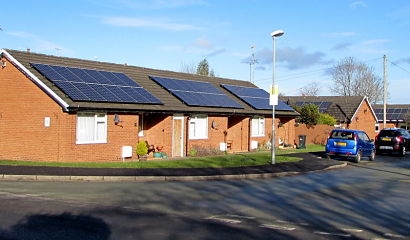
Solar Energy UK’s The Value of New Build Solar report also argues that these measures will be vital for achieving a net zero economy and points out that owners of new Scottish homes already benefit from this rule.
Solar photovoltaic (PV) panels are the enabler for the low-carbon homes of the future, powering heat pumps and electric vehicles. They also lower demands on the grid and the need for infrastructure investments, costs which consumers would otherwise bear as part of their energy bills.
“Recognising these simple and undeniable facts will make for more robust and competitive industries that can meet their climate change objectives whilst affording households and their communities with energy and financial security for generations to come” says the report.
However, it adds that these benefits will only accrue if “considerable change” to energy efficiency standards is delivered.
“Harnessing the power of the sun can address many of the questions raised by the energy crisis – how do we keep warm without breaking the bank, reach net zero, cut bills and bolster energy security?” said Dr Richard Hauxwell-Baldwin, Research and Campaigns Manager for MCS Charitable Foundation. “On top of the obvious environmental benefits of installing solar, this timely report illustrates why it makes financial sense to make solar standard for the new homes that the country needs.”
Based on complex modelling, the report showcases four examples of how solar works across the UK:
A Midlands mid-terrace property
A detached home in southern England
A semi-detached house in northeast Scotland
A housing association end-of-terrace home in London
With PV and a battery storage system, a mid-terrace compliant with the Future Homes Standard 2025 would save around £40,000 over their lifetime, compared to an identical dwelling with no energy efficiency enhancements or low carbon technologies. The precise figure depends on whether gas, direct electric, heat pump or infrared heating is deployed. Either way, dramatic reductions in carbon emissions would be achieved, ranging from 65-85 percent beyond the baseline.
Representing a reasonable best-case scenario, the running costs of a new detached home compliant with the forthcoming standard and installing solar thermal, solar PV and battery systems would be between £2,000 and £3,000 a year. That equates to lifetime savings from a stunning £202,000 to £242,000.
Conversely, the Scottish case study was deliberately chosen to be sub-optimal, with panels facing east-west rather than towards the sun to the south and with smaller-scale systems installed. Even so, the semi-detached home would still save £3,000-4,000 a year, depending on which source of heat is used.
For the socially rented home, the financial savings would be split with the housing association, which would benefit from excess power exported to the grid and greater confidence that the tenant can afford to pay their rent. They would save an estimated £496-772 in the first year.
“This timely analysis from Solar Energy UK clearly demonstrates that solar is a key enabling technology for the transition to electric heating – mitigating the extra running costs for residents” said Stuart Elmes, Founder and Chief Executive of Viridian Solar. “Solar is crucial for the delivery of the Future Homes Standard.”
Aside from being in the interests of both residents and the country, making solar mandatory would also benefit housebuilders. Developers have generally been reluctant to back stringent energy efficiency standards, fearing that this would raise costs and ultimately reduce the number of homes built.
However, house price growth is slowing as the energy price crisis continues to bite. Higher bills are pushing millions of people into fuel poverty, potentially leading to a stagnant property market - homes with pre-installed solar offer a solution for the sector, offering buyers lower bills and carbon emissions.
Furthermore, the cost of solar systems is a fraction of what it used to be.
To deliver these manifold advantages in England, the Future Homes Standard 2025 must mandate solar, with systems specified to provide maximum savings in running costs and carbon. For Scotland, this means adding solar PV to the heat pump specification in the Building Regulations. For Wales, solar must be compulsory under Parts L and F and the Building Regulations. Compliance must also be adequately enforced.
The report also offers recommendations for the finance and construction sectors, including developing green mortgage products that reward investment in solar and other low-carbon technologies and ensuring that builders are trained in solar installation.
The Value of New Build Solar is published alongside The Value of Solar Heat: The Role of Solar Heat Technologies in Meeting Scottish Net Zero Target, part of a suite of prior reports from Solar Energy UK. These include October’s The Value of Solar Heat report and the earlier Smart Solar Homes and The Value of Solar Property.
The MCS Charitable Foundation provided the principal funding for The Value of New Build Solar. Forster Group, Viridian Solar, City Plumbing, and Q Cells provided additional funding.
For additional information:

